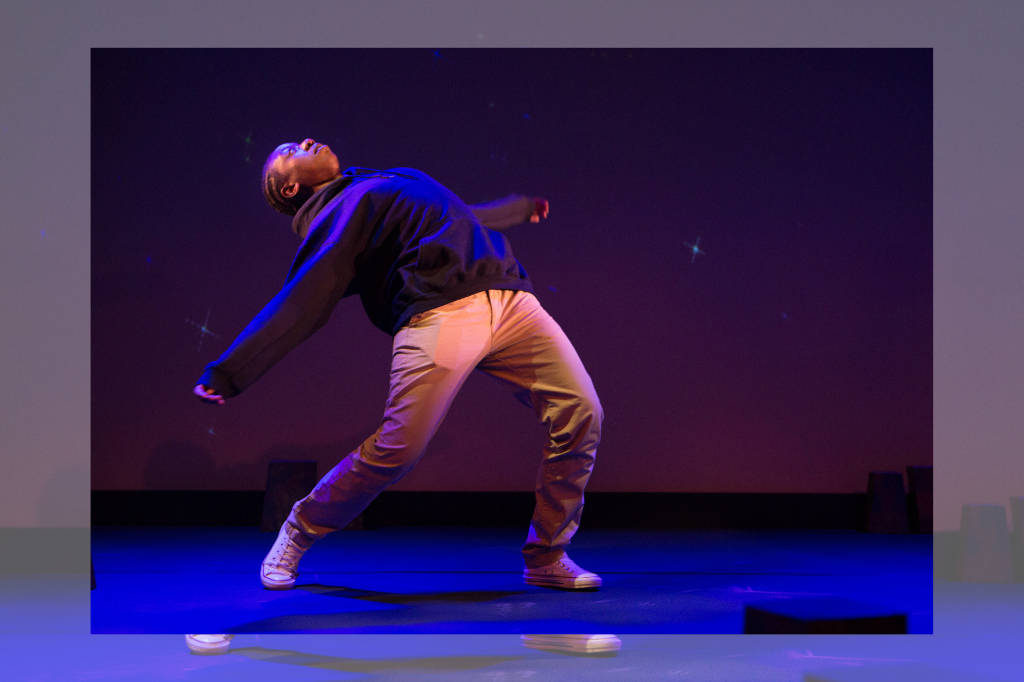REVIEW: Our Fathers, Sons, Lovers and Little Brothers at Tarragon Theatre
When it hits, it hits hard.
When it doesn’t, it recovers quickly and with grace.
Our Fathers, Sons, Lovers and Little Brothers, written by and starring Makambe K. Simamba and presented as a co-production between Tarragon and Black Theatre Workshop, is a “prayer for Black life,” a requiem for lost generations of Black men, a ceremony, a dirge. Simamba’s gut-punch of a monologue defies genre. I’m not the first person to be impressed by it — the piece won two Dora awards in 2019, both for solo performance and for writing.
Before digging into the performance, I’ll state plainly: Simamba’s “main audience” for this piece, as articulated in the above-linked Star preview, is Black teens. That’s not me — I’m a white woman in my early twenties, and there are surely elements of this performance which didn’t resonate with me on a personal level as deeply as they might have for other audience members. But the play’s content is ubiquitous — the racial reckonings it references won’t be breaking news to any audience member, and the conversations Simamba seeks to initiate aren’t necessarily limited to a single demographic.
Unfurling across Tarragon’s sparse Extraspace stage, Our Fathers, Sons, Lovers and Little Brothers follows Black teenager Slimm through his journey into the afterlife, a celestial purgatory framed by a video backdrop and a few brown theatre blocks of varying sizes. Also in the space is a sacred-looking book, a guide for Slimm as he embarks upon his new existence as a murdered Black man. Slimm’s true identity is vague, then mysterious, then all too clear: Simamba navigates the reveal gorgeously, using tissue-thin layers of character to build towards the whole, entire Slimm we see at the end of the play.
Clothed simply in a blue-black hoodie and khakis, Simamba commands the space: she can dance, she can find laughs in unlikely places, and seriously, can she work a room. Simamba is magnetic, surprising, unrestrained — her talent shines through equally as both playwright and performer. The first half of Our Fathers, Sons, Lovers and Little Brothers has only a few infrequent fumbles: moments of imprecise vocal mask, for instance, when Slimm embodies his mother, his friend, his girlfriend. It’s occasionally hard to tell who’s who. But where vocal mask falters, physical choreography prevails: Simamba executes an astonishing physical score magnetically and with total precision. It’s a sight to behold.
Director Donna-Michelle St. Bernard has shaped Simamba’s vision into a concise, efficient solo show — no choice in Simamba’s movement or text work feels redundant or under-supported. Simamba’s performance echoes St. Bernard’s own award-winning play, Sound of the Beast: there’s a clear influence there, and not at all an unwelcome one as two generations of lauded Black playwrights come together to create this thought-provoking work.
This production’s aesthetic composition is what leaves Our Fathers, Sons, Lovers and Little Brothers at the precarious border between good and great. Diana Reyes’ sound design is fine, but a little thin in places — the reverberation of Slimm’s voice in the afterlife somehow feels both unnecessary and incomplete. Video design by Trevor Schwellnus is more consistently strong, particularly in the second half of the show, and yet still feels, at times, unfinished — the on-screen appearance of the text which Slimm reads from the sacred book is only sometimes effectively timed, indicating either opening-night jitters in the booth or an under-rehearsed element of the play. Music, too, sometimes feels hasty — songs like “(Crank That) Soulja Boy” make total dramaturgical sense, but seem unearned in their unedited lengths at the top of the show. Simamba has much to offer in her performance and in her writing: one finds themselves wishing we’d get to that a little quicker.
Our Fathers, Sons, Lovers and Little Brothers is a must-see — the reveal alone is a glorious, heartbreaking moment of live theatre. Simamba has a hit on her hands, which bears repeating even in the years following the piece’s 2019 b current premiere: I look forward to seeing it again in new spaces and with a different design team over the next few years.
Our Fathers, Sons, Lovers and Little Brothers runs at Tarragon live through April 10. It is available digitally starting March 22. Tickets are available here.















Comments